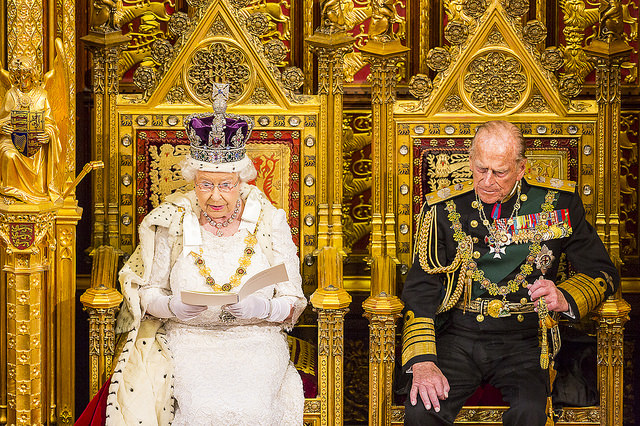The 2016 Queen’s Speech and the Constitution
Mark Elliott looks in detail at the at the constitutional proposals in the latest Queen’s Speech. He writes that although they have the potential to be highly significant it is unclear whether they will amount to much as the Government’s thinking appears to be underdeveloped.
This year’s Queen’s Speech touches on two possible constitutional reform measures. (I pass over the Wales Bill, which was published in draft in October 2015.) The first concerns the replacement of the Human Rights Act 1998 with a “British Bill of Rights”, while second concerns the sovereignty of Parliament and the “primacy” of the House of Commons. If implemented, these measures would be highly significant. But the signs are that, at least for the time being, they may amount to very little in practice — not least because the Government’s thinking in relation to them appears to be undeveloped to say the least.
A British Bill of Rights
The Conservative Party has for some considerable time said that it wants to replace the HRA with a Bill of Rights. Any attempt at reform in this area was stymied in 2010 by the politics of coalition, the Conservatives’ Liberal Democrat partners being staunchly committed to the retention of the HRA. The most that could be managed then was a Commission on a Bill of Rights, whose proposals, such as they were, came to nothing.
Freed from the shackles of coalition, the Government promised in last year’s Queen’s Speech to bring forward “proposals for a British Bill of Rights”. This year’s Speech contained an almost identically worded undertaking promising “proposals” but not a Bill as such. Nothing much therefore seems to have happened in the last 12 months. The reasons are not hard to fathom. In political terms, the Government appears to be divided on the question whether the UK should remain a party to the ECHR — the Home Secretary thinks not — while the politics of devolution represent a major complication. I consider why reform in this area is so fraught with legal, constitutional and political difficulty here.
The briefing notes accompanying the Queen’s Speech put only minimal flesh on the bones of what was said in the Speech itself. According to the briefing notes, the purpose of the Bill would be to “modernise the UK human rights framework”. Meanwhile, it is said that the main benefits of the Bill would be to “continue protecting fundamental rights” while “better protect[ing] against abuse of the system and misuse of human rights laws” so as to “restore common sense to their application”. The briefing notes go on to say that the rights given effect by the Bill would “be based on those set out in the European Convention on Human Rights, while also taking into account our common law tradition”.
Either the Government is choosing not to give much away at present, or there isn’t much to be given away. While the briefing notes implicitly rehearse the criticisms that have been made for some time — the burden of the argument being that the HRA over-empowers judges and over-privileges the undeserving at the expense of the “law-abiding” — there is no hint of any developed thinking about how the perceived shortcomings of the HRA ought to be addressed, or of how reform in this area would be reconciled with the UK’s remaining a party to the ECHR. It is therefore hard to escape the conclusion that the HRA is likely to be around for some time to come, noises about a Bill of Rights notwithstanding.
The sovereignty of Parliament and the primacy of the House of Commons
In a part of her Speech that will have mystified all but the most committed constitutional/political anoraks, the Queen said: “My ministers will uphold the sovereignty of Parliament and the primacy of the House of Commons.” It is unclear whether any connection between the two parts of this statement were intended — a point upon which little light is cast by the briefing notes, and to which I return at the end of this post.
The reference to the “primacy” of the Commons can be dealt with relatively briefly. It is, as the briefing notes affirm, a reference to the Government’s desire — following the row over the House of Lords’ refusal to approve secondary legislation on tax credits last year — to limit the Lords’ role in this sphere. In the review he produced for the Government, Lord Strathclyde recommended legislating to prevent the Lords from blocking any secondary legislation by equipping the Commons immediately to override any objections raised by the Lords. I have written elsewhere about why this proposal is fundamentally misguided, and have noted the excoriating criticism to which it has been subject by a number of parliamentary committees. It is heartening, therefore, that the Queen’s Speech does not promise a Bill in order to implement the Strathclyde recommendation, and that the briefing notes merely state that the Government “is considering Lord Strathclyde’s recommendations carefully and will respond in due course”.
As to the Queen’s assertion that her ministers “will uphold the sovereignty of Parliament”, the briefing notes are uninformative, merely stating that “Parliamentary sovereignty is one of the most fundamental principles of the constitution and the Government is committed to ensuring that it is upheld”. They say nothing, however, about how this might be done. In fact, the Government’s thinking on this matter appears to be inchoate, to say the least. A number of suggestions are in circulation, but none appears to be thought through. The Prime Minister, for instance, appeared in February 2016 to support the idea of a “Sovereignty Act” to ensure that legislation enacted by the UK takes priority — including over European law. I have written in another post about why such a proposal is flawed. Meanwhile, the Justice Secretary, Michael Gove, in evidence given to the House of Lords Constitution Committee in December 2015, suggested that the UK Supreme Court might be made a “constitutional longstop” so as to enable it to prioritize domestic constitutional values over European law (a step which the Supreme Court has in fact already suggested it could take without any need for legislation). The passing and obscure reference to sovereignty in the Queen’s Speech suggests that while the Government wishes to advertise its “commitment” to parliamentary sovereignty, it currently has no developed proposals that would attempt to give effect to that commitment.
I close with a final thought. It is that the linking together in the Queen’s Speech of, on the one hand, support for parliamentary sovereignty and, on the other hand, the possibility of implementing the Strathclyde Review is nothing if not paradoxical. The implementation of Lord Strathclyde’s recommendation would significantly change the terms of the relationship between the Executive and Parliament by fundamentally undermining scrutiny of delegated legislation in the House of Lords — and by extension, given the leading role that the Lords takes in this area, in Parliament as a whole. This would amount not to the assertion of the Commons’ primacy over the Lords. Rather, it would be to assert the primacy of the Executive over Parliament. For a Government committed to the sovereignty of Parliament, that would be a very odd step to take.
 Mark Elliott is Professor of Public Law at the University of Cambridge
Mark Elliott is Professor of Public Law at the University of Cambridge






 Democratic Audit's core funding is provided by the Joseph Rowntree Charitable Trust. Additional funding is provided by the London School of Economics.
Democratic Audit's core funding is provided by the Joseph Rowntree Charitable Trust. Additional funding is provided by the London School of Economics.
“The 2016 Queen’s Speech and the Constitution” https://t.co/J3UjM0UnA2 Interesting piece on the constitutional agenda for the next year
Few and not clear words on the Constitution in the 2016 Queen’s Speech @ProfMarkElliott @democraticaudit https://t.co/tQ4ViO4nCQ
The 2016 Queen’s Speech and the Constitution https://t.co/YJjIa18QnD
Constitutional commitments in #QueensSpeech may not amount to much as Govt’s thinking appears underdeveloped https://t.co/8DVCG8koHH
The 2016 Queen’s Speech and the Constitution https://t.co/Wjado7VowX
The government lacks developed proposals to give effect to its constitutional commitments… https://t.co/r5U4R5JWjt https://t.co/wznuBPtcw5